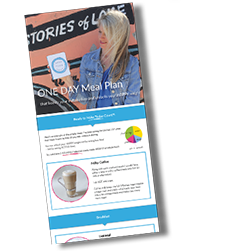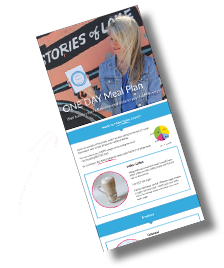
- What can you do if you think your daughter has an eating disorder?
- Find out how to approach this sensitive topic
- Learn 3 ways to support a loved one
This post debunks the 3rd of 5 common weight-loss misconceptions:
If you think your daughter has an eating disorder don’t intervene
All 5 misunderstandings were captured in a short diary entry written by a 13 year-old. Rebecca courageously shared her weight-loss struggle on the Grownups Read Things They Wrote as Kids Podcast. To get the most out of this post, read Common Weight-loss Misconceptions Intro to hear Rebecca’s diary entry and Common Weight-loss Misconception #1 and #2.
If I think my daughter has an eating disorder should I intervene?

If you think your daughter has an eating disorder, it can be difficult to know how to help.
I wanted to write this post to give some insight to parents from the perspective of someone who’s been there and back.
Find out 3 key ways to support a loved one.
If you think your daughter has an eating disorder you can help her get back on track!
Common weight-loss misconception #3:
If you think your daughter has an eating disorder don’t intervene
13 year-old Rebecca:
“She waited a bit and said: Were you measuring yourself?”
It’s clear from this statement, and many others read from Rebecca’s diary, that her mom knew Rebecca was struggling with weight and self-esteem.
Many parents find themselves at a cross roads when they suspect their daughter has an eating disorder. They wonder:

Problem:
Rebecca finds herself where so many people sit when they’re trying to overcome a problem: on the verge of sharing what’s going on.
At that moment I felt desperate. I almost wanted the truth out so she [her mom] could help me.
– Rebecca (diary entry)

My experience
My eating became disordered in my first year of high school (when I was 14 years old). I didn’t approach my parents for help until I was 20. By then I had more than 6 years of self-defeating patterns that were deeply ingrained.
Looking back I see how easy it is to prevent an eating disorder from escalating if your loved one has the opportunity to open up. Then together you can break down misunderstandings and build healthy habits.
Your daughter can get back on track and be a better person having had this difficult experience.
Solution: What to do if you think your daughter has an eating disorder
Don’t wait to be asked for help if you think your daughter has an eating disorder. There are so many other indicators that someone you love needs you.
Tucking problems under the rug leaves them to fester.
If you think your daughter has an eating disorder:
1. Make yourself approachable
If you’re aware that a loved one is struggling, they’ll likely open up if you raise the topic gently. Here’s a few ideas to begin the conversation:
a) Open with a question
Instead of jumping to conclusions (which can feel invasive) give your daughter a chance to share her experience in her own way. This method builds trust between you and your daughter. It also gives your child the chance to feel in control because she can volunteer information. Find a quiet time to express your concerns in a way that feels natural.
You could say:
- You seem preoccupied lately. Is there anything you want to talk about?
- You don’t seem like yourself. Is everything ok?
- If you were worried about something is there anything that would make you hesitant to tell me?
b) Show unconditional love
Even if you think your love is a given, reinforcing this message helps your daughter feel more comfortable telling you something personal.
How can you get this sentiment across? Remind the person you love about her positive qualities. Focus on character traits and examples of when she’s done something great rather than praising something superficial. Tell her about a time you noticed she:
- was kind
- worked hard on a goal
- did something creative, funny or took initiative
Pointing out attributes you admire demonstrates that if your daughter has an eating disorder it doesn’t affect how you feel about her; young people can be incredibly hard on themselves and get lost in over-analyzing what they deem “faults.” In fact:
… research consistently shows perfectionism to be elevated in people with eating disorders and people recovering from eating disorders …
–Journal of Eating Disorders

It can be easy to fixate on one small thing & forget about all the great stuff going on.
If you think your daughter has an eating disorder, reminding her of some of the important things she excels at can help her gain perspective.
Additionally, when someone feels understood and respected for who they are, they feel safe. This secure feeling makes it easier to be honest and can prompt a loved one to open up.
Try opening with a question (A) and then showing unconditional love (B). It could be as simple as:
“Is something bothering you? You’re just such a kind person, I don’t want anything to get in the way of your goals. You work so hard at school and put so much effort into training for soccer and I’m so proud of who you are—all the thoughtful things you do. I don’t want you to walk around worrying about something we can figure out together. 2 people can solve a problem faster than one … “

Photo taken from outside the AGO in Toronto, ON, Canada. Open you’re mind! Good things will grow.
c) Be nonjudgmental
Be prepared to hear something that will surprise you. Consider possible scenarios the person you’re worried about could share so your mind is open. This preparation will help you stay composed. If your daughter has an eating disorder, she will be looking at your body language for cues on how much information to disclose. Often a child wants to protect parents from the truth, especially if they think you’ll react adversely. But if you want to get to the bottom of what’s going on, which will help your child both in the short and long term, you need to be respectful of things you don’t understand.
Recognizing there is always a reason behind behaviour—even if you don’t know what it is, will help you be more accepting of experiences different from your own. Remember, disordered eating is a manifestation of something else that needs to be addressed; having a complicated relationship with food is a coping mechanism for an underlying issue that can be resolved. Getting on a path to recovery begins when your loved one is able to share what’s going on. Then you can seek the necessary support together.

Animals are nonjudgmental. They only care about kindness (and walks!) We have much to learn about love from our furry friends who have incredible emotional intelligence.
Make it clear you’re open to the truth and ready to be leaned on. Say something like: We all have things we want to improve. Be ready to volunteer something you’re personally working on.
d) Be vulnerable
Be human. Kids are capable of more mature conversations than we give them credit for. Confide in your child. Tell her about something you’ve been through and explain how talking to someone else helped you overcome a difficult time. Meaningful relationships require give and take. People are much more willing to open up if you do too.

e) Be optimistic
A positive attitude goes a long way. And it’s contagious! Tell your loved one you believe in them. Giving examples of other hurdles they’ve overcome is a great way to be encouraging. Explain there’s a solution to everything. Say: If something’s happening to you it’s happened to a lot of people who have come out the other side. You will too!
When you think your daughter has an eating disorder:
2. Learn together
You don’t need to know all the answers to intervene if you think your daughter has an eating disorder. The main thing is to be available so the person you care about isn’t seeking solutions alone. Together you can collect information, build a plan toward health and figure out the best role you can play in their recovery.
When you think your daughter has an eating disorder:
3. Build in accountability
An important role a parent can play is being someone to check-in with on a regular basis. Then the person recovering can report on how they’re doing. For example, someone who is bulimic can benefit from letting a loved one know how many times they’ve purged each day, week or month with the goal of it being one less time per report period.
Regular contact:
- prevents behaviour from slipping out of control
- prompts reflection so you can figure out why something did or didn’t work
- makes you aware of each small victory so you can celebrate together & reinforce positive behaviour

Accountability can be a phone call away
When I first told my parents about my eating disorder they immediately put me on the meal plan at university. By then my situation had escalated and though it would not have appeared this way from the outside, every part of my life was disordered (I was hardly going to class, etc.) The school cafeteria had enough regular food choices that my parents and I could easily plan a few standard balanced meals ahead of time (the way parents can when their child still eats at home). Then I could get on with my life between meals. In the beginning I called them when I woke up (to report if I’d purged in the night), after each meal (to confirm I ate everything I agreed to eat and to let them know I hadn’t been sick) and before I went to bed.Checking in regularly at the beginning made my road back to health less overwhelming. It also allowed me to compartmentalize the day into 5 blocks (wake up to breakfast, breakfast to lunch, etc.) It helped me focus on trying my best in each block of the day rather than fixating on every aspect of my life being absolutely perfect; by that point if the tiniest thing went wrong I’d say I ruined the day which would trigger binging and purging. I’d not let myself study or do school work, cancel social engagements, etc., all to punish myself in order to put more pressure on tomorrow being perfect.
Dividing the day up into a few tiny blocks with set report periods was a huge help for me. I got better at making realistic goals and being kinder to myself, which helped me become more flexible. Soon my life took momentum again. Instead of worrying about everything going exactly to plan, I started feeling good about little improvements in areas of my life I’d neglected, including my health. As well, no longer hiding a huge secret from people who care about me took a huge weight off my mind.
Please note: When things stabilize you can lengthen the time between check-ins. But it’s still important to keep regular sessions organized ahead of time. Here’s a link to more information about that stage of my recovery.
Building in accountability with regular check-ins works best when:
A. Your loved one:
- agrees to be honest with good and bad news
- is a willing participant; you cannot help someone who doesn’t want to be helped
- makes health a priority; thou you can help her make health a priority by explaining that a healthy weight is the reflection of a healthy lifestyle—not “determination and discipline” like the diet industry leads us to believe
B. You are:
- prepared with questions you and your child have organized ahead of time. For example, if your daughter is trying to cut back on exercise or stop using it as a form of purging, together you could decide that your role is to ask the following each Friday: How many times did you workout this week?
- unconditional no matter the update; your child needs to know you can handle bad news and use it as a marker to improve on
- nonjudgmental
- vulnerable
- optimistic; remember, making a mistake is no big deal. In fact, it’s part of the process. Tell your child to focus on her next choice and making it healthy. Praise your child for being brave by being honest. There are lots of good things to acknowledge even after a misstep.
- willing to learn together

Troubleshooting: When you think your daughter has an eating disorder
Often a loved one won’t open up right away
Be patient. She’ll likely need some time to get used to the idea of sharing a secret. It may take a few days or longer before she decides to tell you what she’s thinking.
 Make yourself available
Make yourself available
When you’re child is ready to talk it’s important you don’t miss the opportunity. Keep assuring your child that you’re there for her, by being there for her. Actions speak louder than words. Just spending some quality time together can build trust and lead to a discussion at another time. This activity can be a game of scrabble, going to see a movie or suggesting something you haven’t done together for a while. Even asking about homework or friends can be a good launch into a more intimate conversation.
Continue to check in
Revisit Getting Started (above) and reword some of your questions. Perhaps coming from a new angle can get your child talking after they’ve had some time to think about the fact you want to help.
Remember, feeling embarrassed plays a big role in why people keep secrets
The more you can make your child feel at ease the more likely she’ll open up. Shame leads to secrecy, as discussed in Misconception #2: Keep your weight-loss goals secret.
I’m too embarrassed to tell them I want to lose fat.
– Rebecca, Grown Ups Read Things They Wrote as Kids
Reassure your daughter that weight loss is about “working smarter, not harder.” It’s important to understand that weight loss is not about having the willpower to stick to diet rules, tips and tricks. This information can help your loved one feel better about herself and be more willing to talk. Then you can get to the heart of the issue. Focus on what healthy eating and exercise looks like, and have a strategy to reach those goals. You can build healthy habits together. Here’s a good place to start.
If time is passing and none of the above is working, try being more direct
Find a loving way to express concern about your child’s health—not her weight or food choices. Mention a change in your daughter that concerns you but doesn’t invade her privacy. For example, I’ve noticed you’ve been exercising more … The idea is just to get the conversation going. Once your daughter offers some information the conversation will develop on it’s own.
Going in with guns-a-blazing about the behaviour that concerns you the most, or getting into specifics like “I saw you eat a lot of cookies at the school fundraiser” can do more damage than good. Intervening if you think your daughter has an eating disorder is about being a friend, not catching someone out. If you think your daughter has an eating disorder, it’s not bad behaviour. It’s unhealthy behaviour that can improve with love and support.
Stay calm
If your child gets upset or angry let them air their frustration. Try to diffuse the situation by listening, rather than joining in or being defensive. Getting your child to open up can be a process. Demonstrating that you’re patient can build a foundation for a constructive conversation at a later date. Even if your child doesn’t act like it, confiding in you will be a relief. They won’t even realize how much stress and pain they’ve been carrying around until after they’ve connected with someone they love. It’s amazing how a good night’s sleep after a difficult conversation can bring perspective. Decide ahead of time to be the bigger person if anything hurtful is said. You’ll likely find you make more progress after the initial discussion.
Talk to your network
Never underestimate the power of communication. By opening up to a few people you trust you’ll find others have had similar experiences. It could be a friend who’s daughter has an eating disorder, a colleague’s relative or a friend of a friend. Building on the positive experiences of others can save you lots of time, energy and heartache. As well, it’s important to broaden your own support network.
Seek expert guidance
If you’re concerned your daughter has an eating disorder and have had no progress in getting her to open up, make an appointment to meet with a health professional who can give you more ideas and offer direction. Talking to your family doctor or a doctor at a walk-in clinic one on one (just you and your doctor) and sharing your concerns will help you figure out what to do next. Ask the doctor if they can recommend an eating disorder expert or suggest any resources you can use to learn more.

Summary: Why you should intervene if you think your daughter has an eating disorder
If you think your daughter has an eating disorder, try to flip the situation around and focus on the positive. Going through something together always strengthens relationships. Your time and interest is an investment in one of the most important relationships in your life. It’s incredibly rewarding to watch someone transition into a healthy, happy person. Helping a loved one will allow them to redirect their energy into something productive. Small changes make a big difference.
If you think your daughter has an eating disorder, it is a beautiful thing that you can be there for her when she’s ready to make health a priority—which is also how you lose weight.
Build healthy eating and exercise habits. A healthy weight will follow.
Next Steps:
Consider a few ways to broach the topic if you think your daughter has an eating disorder. If there isn’t a chance to bring up the topic naturally, plan some time together this week. Give yourself a deadline to initiate the first conversation. Keep your goal in mind: Ultimately it is to connect with your child and build healthy habits together; every member of your family can benefit from understanding what healthy eating and exercise looks like and having a strategy to work toward those goals. What’s more important than your health? Sign up for my weekly blog post (below) and you’ll receive one of the best strategies I learned. It will help you and your loved one build healthy routines—or reach any goal.
Please note: If you’re preoccupied by trying to lose weight and want to approach someone you trust, read Weight-Loss Misconception #2: Keep your weight-loss goals secret. It will give you some ideas on how to get started.
I don’t know my name, by Grace VanderWaal
“So you say I’m not trying, but I’m trying… to find my way.”
If you think your daughter has an eating disorder, believe me she’s trying. With your help she can access more resources and understand how to get back on track. When you see someone you care about on the road to health and watch her reconnect with her interests, you’ll experience the incredible honour of helping someone who is “lost, trying to get found” reach their potential.
P.S. When I approached my parents for help for the first time in my 2nd year of university this happened.

 These kinds of meals and snacks unlocked my HAPPY weight 21+ years ago (I lost 30 pounds without dieting!)
These kinds of meals and snacks unlocked my HAPPY weight 21+ years ago (I lost 30 pounds without dieting!)
You'll also be subscribed to my newsletter. Don’t like it? Unsubscribe in one click

 These kinds of meals and snacks unlocked my HAPPY weight 21+ years ago (I lost 30 pounds without dieting!)
These kinds of meals and snacks unlocked my HAPPY weight 21+ years ago (I lost 30 pounds without dieting!)
You'll also be subscribed to my newsletter. Don’t like it? Unsubscribe in one click




Sharing what I learned makes the 10 years I STRUGGLED worth it
Do you think your daughter has an eating disorder? Have you approached her? What worked? What didn’t work?
Here’s a powerful story about a parent-child relationship and overcoming obstacles together. While it doesn’t focus on the topic of whether or not your daughter has an eating disorder, it’s inspiring to see the potential you have to build a healthy relationship with your son or daughter. It’s also a great example of how being honest can break barriers.






Great article Kelly! I appreciate that it must have been difficult for you to write this one.
It would have been difficult a few years ago but now that I understand my eating disorder I’m no longer full of regret. Instead I’m grateful for the important lessons it’s taught me that I can apply to the rest of my life. Sharing what I learned makes those 10 years worth it 🙂 Thanks so much for your thoughtful comment Carole!
I have enjoyed reading your article and never knew how affected people could be. and how hard it is to get past it. It was quite an eye opener.
Just one question, the article is about a daughter. What about boys, do you know if they have eating disorders too, or is it specifically a “girl” thing?
Thanks Marianne! It’s surprising how far mental health can spin out of control if it’s not intercepted. But with a focus on baby steps and some ongoing support it can quickly improve. Initially I wrote this post by interchanging son/daughter and his/her but it added confusion so I just stuck to one gender. Approximately 1/3 of all people who experience eating disorders are male. “In the United States, 20 million women and 10 million men suffer from a clinically significant eating disorder at some time in their life, including anorexia nervosa, bulimia nervosa, binge eating disorder or … other specified feeding or eating disorder …” This statistic is from this link which is a great resource: https://www.nationaleatingdisorders.org/get-facts-eating-disorders